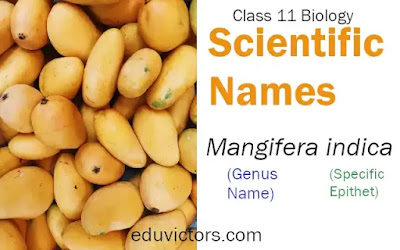Biology - Scientific Names
1. Swedish botanist Carolus Linnaeus established binomial nomenclature.
2. Caper Bauhin expressed proposed binomial nomenclature for the first time
3. In binomial nomenclature, the first word is a generic name having first letter capital and second word is a specific epithet having first letter. e.g. Homo sapiens, Mangifera indica
4. After end of biological name, the name of author is written in abbreviated form who gave the name to that organism.
5. Both the words of a biological name when handwritten are separately underlined and when printed are typed in italics to indicate their Latin origin and also give respect to the name.
6. Scientific names should not be as small as three letters or as long as twelve letters.
7. Lamarck introduced Trinomial nomenclature which involves the use of three words for a name so that the names of subspecies (animals) or varieties (plants). For example Corvus splendens splendens - Indian crow
Following are the scientific names, commonly asked in examinations:
1. Man - Homo sapiens
2. Lion - Pantheon leo
3. Tiger - Panthera tigris
4. Indian Bee - Apis indica
5. Paddock - Rana tigrina
6. Cat - Felis domestica
7. Dog - Canis families
8. Cow - Boss indicus
9. Buffalo - Bubalis bubalis
10. Bull - Boss primitive tars
11. Goat - Kepta hitamus
12. Sheep - Ovi's arise
13. Pig - Susphroca domestica
14. Cheetah - Panther pardus
15. Bear - Ursus matitimus carnivera
16. Rabbit - Orictolegus cuniculus
17. Deer - Cervus elaphus
18. Camel - Camelus domedarius
19. Vixen - Canidae
20. Langur - Hominodia
21. Fly - Masca domestica
22. Mango - Mangifera indica
23. Paddy - Oryza sativa
24. Wheat - Tricticum aestivium
25. Peas - Pisum sativium
26. Mustard - Brassica compastories
27. Peacock - Pavo christace
28. Elephant - Ephilas indica
29. Dolphin - Platenista ganketica
30. Lotus - Nelumbo nucifera Garten
31. Banyan - Ficus bandhalensis
32. Horse - Equus cabellas
33. Sugarcane - Sugarcane officium
34. Onion - Allium sepia
35. Cotton - Gasipeum
36. Peanut - Arachis
37. Coffee - Coffea arabica
38. Tea - Thia sinensis
39. Angur - Vitius
40. Turmeric - Curcuma longa
41. Maize - Zea mays
42. Tomato - Solanum lycopersicum
43. Coconut - Cocoa nucifera
44. Apple - Melas pumia / domestica
45. Pear - Pyrus couminis
46. Saffron - Crocus sativius
47. Cashew - Anacardium aromaticum
48. Carrot - Dakas carota
49. Ginger - Zingiber officinale
50. Cauliflower - Brassica oleracea
51. Reindeer - Ruservus duvacelli
👉See also:
The Living World (AIPMT 7 MCQs)
The Living World (Taxonomical Aids)
The Living World VSQA
An overview of Virus and Viroids (Q & A)
Biological Classification (NCERT Chapter Q & A)

No comments:
Post a Comment
We love to hear your thoughts about this post!
Note: only a member of this blog may post a comment.